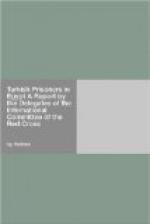The officers’ mess is entrusted to private contract. They arrange their own menu. The daily board is very moderate. Well-stocked canteens enable them to obtain additions at prices fixed by the authorities.
The sick in hospital have a regimen suited to their condition prescribed by the doctors. The milk provided is of excellent quality.
The health department is remarkably well organised everywhere. Drinking water and water for washing purposes are equally abundant. There is an ad libitum supply for douches and baths in every camp. The arrangements for laundering linen are very efficient.
Each camp is provided with a disinfecting furnace, linen and upper garments being sterilised once weekly. There are no vermin anywhere. Special pains are taken over the cleansing of prisoners newly arrived from the front. The result of these measures and of the system of vaccination is seen in the entire freedom of the camps from epidemics.
Turkish or English latrines are sufficient in number, odourless, and regularly disinfected.
In every camp medical attention is given by a staff of first-class English physicians, assisted by Armenian or Syrian doctors; hospital orderlies keep the quarters in perfect order. The infirmaries are spacious, well lighted, thoroughly stocked with drugs and with surgical apparatus and dressings.
If dentistry be needed, which is rare among Ottomans, it is supplied by dentists from the town or resident in the camps.
Cases of mutilation are provided with artificial limbs.
An examination of the medical register in all the camps has convinced us of their good sanitary condition. The small number of sick, and the slight character of the ailments, corroborate what we have ourselves observed from the hygienic point of view. The death-rate is very low.
Deceased prisoners are interred with military honours and according to the rites of their religion.
The space enclosed within the camps permits the prisoners to enjoy walking exercise as well as outdoor games.
The English military authorities have not sanctioned compulsory work for prisoners. Except for sanitary fatigue duties, prisoners have the whole disposal of their own time. The numerous complaints provoked in other countries by forced labour are entirely absent among the Ottoman prisoners in Egypt.
Imaums take religious charge, and the prisoners have full liberty to carry out their daily worship.
Correspondence is less active than elsewhere owing to the large proportion of illiterate prisoners. Letters are long on the road because of the great distances traversed. The censorship is carried out in a liberal spirit and gives rise to no complaints. Money orders sent from Turkey are paid in full; but their number, as well as that of parcels, is restricted.




